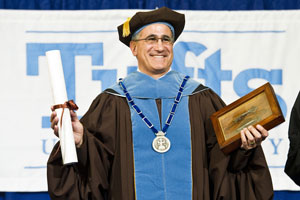
- Photo courtesy of Tufts photography
A college education doesn’t simply benefit individuals, it generates knowledge and discovery that serve all of society, said Anthony P. Monaco at his inauguration as Tufts University’s 13th president on Oct. 21.
“At its best, higher education offers a chance of freedom to any deserving young person, the freedom to escape the limitations of one’s knowledge or experience or social class—and to live up to one’s abilities,” said Monaco, a noted geneticist who was pro-vice-chancellor for planning and resources at the University of Oxford before assuming the Tufts presidency in August.
Universities and the students they educate have a vital role in solving the critical problems the world faces, he said. To tackle those issues, universities need to foster far-reaching collaborations across academic disciplines, a course that Tufts is already pursuing.
Consider the fact that almost a billion people around the world don’t have access to clean water every day, said Monaco. “This is a complex issue that encompasses politics, climate, engineering, medicine and agriculture.” Tufts is addressing the problem by marshaling resources in six different schools under a single program, Water: Systems, Science and Society.
It Takes a University
Quoting Richard Vogel, professor of engineering and the faculty chair of the water program, Monaco said that “it takes a university” to solve such daunting challenges. He noted that his administration will emphasize these kinds of interdisciplinary programs.
Monaco also stressed that Tufts is “a place to be oneself.” “We value people regardless of their beliefs, cultural background, ethnicity, gender or sexual identity,” he said. “Those who are oppressed and stigmatized within the broader society are welcomed at our doorstep. We feel passionately that they should be able to study in an environment free of discrimination.”
Ensuring access to a Tufts education will be another priority of his tenure, Monaco said. A graduate of Princeton, he cited his own experience as the first in his family to graduate from a private university, thanks to generous financial aid.
“Without that help, I probably would have never become a scientist, would not have had the opportunity to explore the origins of disease, and I certainly would not be standing before you today,” he said. “College can make all the difference in the world.”
In fact, he said, universities like Tufts “are one of our society’s wisest investments.”
Other speakers at Monaco’s inauguration included Shirley Tilghman, president of Princeton University and a fellow geneticist, and Sally Shuttleworth, a professor of English literature at Oxford who headed Oxford’s Humanities Division when Monaco was pro-vice-chancellor.
James A. Stern, alumnus and chair of Tufts Board of Trustees, welcomed a crowd of more than 1,300 assembled on the residential quad on Tufts’ Medford/Somerville campus. Representatives from more than 100 universities and colleges joined Tufts faculty, students, staff, alumni and guests at the ceremony.
The ceremony was the highlight of an inauguration week that included a student arts showcase, a research symposium on child development, and receptions on all three of Tufts’ Massachusetts campuses.
Monaco, a native of Wilmington, Del., attended Princeton before earning an M.D. and Ph.D. from Harvard. A distinguished neuroscientist, he identified the first gene specifically involved in human speech and language.
Tufts University, located on three Massachusetts campuses in Boston, Medford/Somerville, and Grafton, and in Talloires, France, is recognized among the premier research universities in the United States. Tufts enjoys a global reputation for academic excellence and for the preparation of students as leaders in a wide range of professions. A growing number of innovative teaching and research initiatives span all Tufts campuses, and collaboration among the faculty and students in the undergraduate, graduate and professional programs across the university’s schools is widely encouraged.















Reader Comments